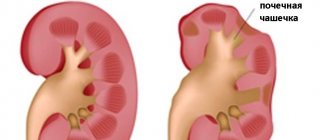Intestinal carcinomas are malignant tumors that affect the epithelium of the rectum and colon. In the medical literature, this group of diseases is called “colorectal cancer.”
Oncological diseases of the intestinal system rank second in prevalence after lung cancer. At risk are patients over 40 years of age. The maximum number of cases is diagnosed at the age of 60–70 years.
General information
The name intestinal cancer summarizes all types of malignant tumors that affect the human intestine along its entire length. colorectal cancer most often develops , that is, malignant nutrition of the large intestine.
The small intestine is affected much less frequently. According to medical statistics, colorectal cancer is diagnosed in 89% of cases, malignant tumors of the small intestine - in 11% of cases. The ICD-10 code is C20 (Malignant neoplasm of the rectum). Most often, the disease is diagnosed in older people. According to statistics, about 36% of cases of this type of cancer occur in people over the age of 60. Colorectal cancer affects the lining of the colon or rectum. This is a dangerous disease, so people who have been diagnosed with this require immediate treatment.
Colon cancer (ICD-10 code - C18) can develop in different parts of the colon. It consists of the transverse colon, ascending colon, descending colon and sigmoid colon.
Duodenal cancer often develops as a process of metastasis of other types of malignant processes. Primary oncological lesion of the duodenum rarely develops.
When talking about the causes and pathogenesis of the disease, experts combine all types of malignant intestinal lesions. These diseases have similar symptoms and complications. But if the disease is diagnosed at an early stage, treatment is effective. This is why it is extremely important to pay attention to any warning signs and undergo all examinations in a timely manner.
How to recognize the disease, how quickly the pathological process develops and metastases , you can learn from this article. We will also talk about effective treatment regimens for the disease and the prognosis at one or another stage of intestinal cancer.
Rectal cancer - what is it?
This malignant cancer originates from the epithelium of the rectum. This tumor has the characteristic features of any malignant formation - rapid growth, invasion of neighboring tissues, metastasis.
Men and women are equally susceptible to the disease. An increase in the number of cases is observed from the age of 45, and the peak incidence occurs among 75-year-olds.
Pathogenesis
The colon has the highest bacterial density and diversity throughout the gastrointestinal tract. This indicates that the mural microbiome plays an important role in the pathogenesis of the disease. At this stage, the pathogenesis of colorectal cancer is still being actively studied. However, research suggests that some types of bacteria contribute to tumorigenesis.
It has been noted that the increase in cases of this type of cancer in developed countries is associated with a high meat content in the diet and, accordingly, a decrease in the amount of fiber consumed. As a result of such nutrition, the growth of intestinal bacteria is activated, which, in turn, produce carcinogens.
There are also a number of other risk factors: chronic inflammatory diseases of the colon, bad habits, heredity, etc.
Causes and risk factors
The mechanism of development of intestinal cancer has not yet been precisely established. However, the factors that increase the likelihood of the disease have been studied quite well. Among them:
- inherited predisposition;
- the presence of polyps in the intestines;
- chronic inflammatory diseases - Crohn's disease, ulcerative colitis, diverticulosis, chronic obstruction;
- unbalanced diet with excessive amounts of red meat, smoked meats, spicy seasonings, fatty and fried foods;
- exposure to ionized radiation, carcinogenic compounds;
- obesity, sedentary lifestyle;
- age over 45 years.
Classification
The concept of “bowel cancer” combines a number of malignant diseases that affect different parts of the intestine. However, the colorectal form of the tumor is most common.
There are several different classifications of stages of this form. The simplest classification is considered to be:
- The first stage - the tumor spreads exclusively to the inner layers of the intestine. At this stage, about 90% of cases of the disease are cured.
- The second stage - the tumor actively increases and spreads through the intestinal wall to neighboring organs and structures.
- The third stage - the pathological process spreads to local lymph nodes (metastasis is observed).
- Stage four – the tumor spreads to the liver, lymph nodes, and lungs located remotely from the tumor.
Taking into account the clinical course of the disease, the following forms of oncological process of the colon are determined:
- Toxic-anemic – general symptoms ( anemia , fever ) dominate.
- Dyspeptic - discomfort in the gastrointestinal tract predominates, similar to the symptoms of gastritis or cholecystitis .
- Enterocolitic – intestinal disorders predominate.
- Obstructive – intestinal obstruction is noted, which progresses.
- Pseudo-inflammatory - manifestations of inflammation of the abdominal cavity are observed, in which pain, fever, and leukocytosis .
- Atypical - the presence of a tumor is determined by palpation, while adverse symptoms practically do not appear.
Diagnostic measures
Intestinal oncology
Diagnostic measures begin with the analysis of stool for occult blood. It is recommended to conduct such screening for patients with chronic gastrointestinal diseases on a regular basis. And for those who have crossed the fifty-year mark, the study is shown once a year.
Frequent examination does not guarantee earlier detection of cancer. Since it takes 2–3 years from the onset of the mutation to the first diagnostic signs. Therefore, it makes no sense to take a stool test for occult blood without any symptoms more than once a year.
If the test result for occult blood in stool is positive, the patient will be referred to:
- irrigoscopy - x-ray examination with the introduction of a contrast agent;
- sigmoidoscopy – endoscopic examination of the intestine. If necessary, during the procedure a biopsy of suspicious tumors and removal of small polyps is performed;
- Colonoscopy is an endoscopic examination of the rectum. Allows you to examine a significant part of the intestine - from 1.2 to 1.5 meters - to take a biopsy sample and remove benign neoplasms.
The obtained tissue samples are sent for histological examination. When the diagnosis of carcinoma is confirmed, a CT scan of the peritoneum is indicated to determine the size of the tumor, its spread to neighboring organs and lymphatic collectors.
Causes of bowel cancer
The main reasons for the development of tumors in the intestines are as follows:
- Heredity - the tumor is more often diagnosed in people whose close relatives had this type of cancer, or they were diagnosed with intestinal polyps.
- Excessive consumption of red meat - those who eat pork, lamb, and beef too often are at risk.
- Poor diet in general - the likelihood of illness is increased in those who consume few vegetables, fruits, grains and at the same time eat a lot of animal fats.
- Insufficient physical activity.
- Smoking, alcohol abuse.
- Inflammatory bowel disease - the likelihood of the disease increases with Crohn's disease and chronic ulcerative colitis .
- Unfavorable environmental conditions.
Stages
Clinical symptoms of intestinal cancer directly depend on the stage of the disease.
- The tumor develops within the epithelium and does not penetrate other tissues; there are no metastases. Clinical manifestations are absent or so insignificant that they do not attract the patient’s attention. Diseases are discovered accidentally during histological examination of removed polyps.
- A malignant neoplasm grows into the submucosal or muscular layer without affecting adjacent lymph nodes. The disease may manifest itself in the form of initial general symptoms.
- The tumor grows through the entire intestinal wall and can affect neighboring organs. Metastases are present in regional lymph nodes. Severe symptoms include general malaise and intestinal dysfunction.
- The malignant node gives multiple metastases to distant organs. The patient experiences constant abdominal pain, intestinal bleeding, and severe intoxication with tissue breakdown products.
Symptoms of bowel cancer
If a person develops bowel cancer, there may be few or no symptoms in the early stages. The first signs of intestinal cancer at an early stage do not always manifest themselves as malaise, loss of strength or other unpleasant symptoms. Therefore, recognition of the disease at an early stage is most often achieved during screening or in the process of research for other diseases. As the disease develops, it gradually causes unpleasant symptoms. However, the first stage of colorectal cancer often occurs unnoticed by the patient.
The first symptoms in women and men may be as follows:
- Painful sensations - colorectal cancer can manifest itself as pain in the abdomen. In the early stages, pain varies in intensity and nature.
- Noticeable changes in the functioning of the intestines - such signs of the disease are associated with intestinal disorder, since the development of the tumor leads to disruption of motility and passage of intestinal contents.
- Increased urination.
- The appearance of blood in the stool. In this case, it is important to exclude other causes of this symptom, such as anal fissures or hemorrhoids . The color of the stool sometimes turns black. The shape of the stool also changes.
- Discomfortable sensations, bloating, a feeling of heaviness, a full stomach after eating. As a result, men and women's appetite decreases and people begin to lose weight. Belching , vomiting, and nausea may also occur
- Flatulence , rumbling in the stomach, constipation .
If such symptoms persist for a long time, you should consult a doctor.
As colon cancer develops, it often leads to the appearance of mucus, pus, and blood in the feces. Heavy bleeding is rare, but prolonged bleeding can still lead to anemia in children and adults.
The first symptoms of duodenal cancer often include pain in the right hypochondrium, belching, and heartburn , which, when the duodenum is affected, is associated with increased acidity. Jaundice is noted. In addition, general signs of duodenal cancer appear - fatigue, loss of appetite, weakness, tachycardia , dizziness , fatigue . A person who develops a pathological process may suddenly lose weight.
Symptoms of cancer of the cecum appear similarly, in which dropsy in the abdominal cavity and enlargement of the liver can also be observed. With a tumor of the cecum, other symptoms also appear.
Colon cancer also causes similar symptoms. As the process progresses, cramping pain may develop, which is characteristic of intestinal obstruction .
The manifestation of a tumor of the small intestine may also be invisible in the initial stages. At later stages intoxication and weight loss occurs. Intestinal bleeding and obstruction are possible. If the tumor progresses, neighboring organs may be compressed. Ascites, jaundice, and pancreatitis .
Signs of intestinal cancer in women and men are in some cases associated with the development of intestinal obstruction or intussusception. In this case, colon cancer causes severe pain that does not go away. In this case, stool and gases do not pass, and rapidly increasing manifestations of general malaise are noted. In such a situation, immediate medical attention is required, otherwise the condition will be fatal.
In women, intestinal cancer can lead to dysfunction of the genital organs. In such a situation, the gynecologist prescribes additional examinations to determine the tumor of the colon.
Symptoms of the disease
Intestinal carcinomas have a slow progression, and several years pass from the onset of tissue degeneration to the first signs of the disease.
Signs of the pathological process:
- fatigue;
- weakness;
- severe anemia;
- transient constipation or increased frequency of bowel movements, depending on the location of the carcinoma and its effect on
- surrounding intestinal tissue;
- colic;
- intestinal obstruction;
- blood in stool;
- the nature of the feces is ribbon-shaped;
- possible intestinal perforation with the development of peritonitis;
- if the rectum is affected - bleeding during bowel movements;
- pain in the perirectal area;
- feeling of incomplete bowel movement;
- inflammation of the supraclavicular lymphatic collectors;
- ascites.
If a patient has a history of hemorrhoids, he is indicated for colorectal cancer screening.
Tests and diagnosis of colon cancer
Speaking about how to check the intestines for oncology, it should be noted that the optimal diagnostic method should be chosen by the doctor. As a rule, early diagnosis is carried out during a preventive examination or during studies related to other diseases.
To check the small intestine for the presence of a tumor, most often, if the development of intestinal cancer is suspected, a colonoscopy with biopsy . It is colonoscopy that makes it possible to conduct a detailed examination of the large intestine (rectum, colon, sigmoid, cecum).
To check the condition of the intestines without a colonoscopy, MRI is used. The most informative method, which makes it possible to obtain answers to a number of important questions, is PET-CT. In particular, this study makes it possible to determine what stage of the patient’s disease, whether he has metastases , whether surgery is advisable, etc.
To establish a diagnosis, a pathomorphological examination of the tissue is required. It makes it possible to distinguish between benign and malignant tumors. At the same time, it is important to conduct such a study qualitatively, since errors can be fatal for the patient.
An analysis is also carried out for the presence of occult blood. A special test is used for this.
An important stage of the examination is laboratory tests, in particular a blood test, during which tumor markers and other blood test indicators are determined. Speaking about which tumor marker indicates the presence of a malignant process in the body, it should be noted that only a specialist can correctly decipher the data obtained.
Other indicators (ESR, etc.) are not decisive during diagnosis, since the ESR level is not elevated in all such patients.
If necessary, other examinations are also practiced: rectosigmoidoscopy , irrigoscopy , etc. During the examination, laboratory tests, etc. are also carried out.
Treatment methods for colorectal cancer
The small size of the tumor and its growth only through the mucous and submucosal layer of the rectum, without affecting the muscular and serous layer, allows surgical removal of the tumor itself. Sometimes it is possible to perform surgery through the colon using a colonoscope.
If it has grown into the muscle layer, then rectal resection or extirpation (complete removal of the organ) is indicated. The perirectal tissue and lymph nodes are also removed, in which metastases are already detected in 20% of cases. To perform the operation, two approaches are used - laparotomy (dissection of the abdominal wall) and laparoscopy (operation using video equipment through several punctures in the abdomen).
The type of surgery is selected based on the location of the tumor. The high position makes it possible to remove the tumor and temporarily bring the end of the intestine to the abdominal wall - to form a colostomy for defecation. Such manipulation is necessary if it is not yet possible to sew the ends of the intestine together. The second stage, after some time, restores the integrity of the intestine.
If the tumor process is located low, if there is no healthy tissue left below it, the affected area and anus are removed, and a colostomy is applied to the abdominal wall.
Prevention of bowel cancer
Proper prevention makes it possible to reduce the likelihood of developing oncological processes in the intestines. However, all preventive measures should be practiced constantly. It is most important to follow these guidelines:
- Quit all bad habits. You should minimize your alcohol consumption and stop smoking.
- Introduce as much fiber into your diet as possible. Dietary fiber promotes intestinal motility and prevents stagnation. It is important to eat fresh vegetables and fruits every day.
- Eat right, minimizing the amount of junk food. It is important to limit the amount of fried foods and fast food.
- Practice physical exercise every day. Physical activity is important to improve peristalsis.
- When the first unpleasant signs appear, you should consult a doctor.
- Regularly undergo preventive examinations. This advice is especially relevant for those diagnosed with Crohn's disease , nonspecific colitis , and intestinal polyposis .
Contraindications
The operation is contraindicated under the following conditions:
- severe chronic diseases of the patient - arterial hypertension, coronary heart disease, when it is impossible to give anesthesia;
- advanced age of the patient;
- advanced stages of cancer.
In case of a widespread process with metastasis to many organs, palliative resections are used, aimed at alleviating the patient’s condition. Symptomatic operations - the application of bypass anastomoses to relieve the intestines and avoid complications in the last stages of cancer.
Diet
Diet (nutrition) for intestinal cancer
- Efficacy: no data
- Timing: constantly
- Cost of products: 1800-3800 rubles. in Week
Proper organization of nutrition for intestinal cancer is very important, as this is one of the points of the overall treatment plan. The patient needs both a special diet to maintain immunity and proper nutrition after intestinal surgery.
When organizing meals, it is important to adhere to the following tips:
- Foods with preservatives, dyes and chemical components should be excluded.
- Fats should be kept to a minimum, and sugar and sweets should be completely avoided.
- The menu should contain only fresh and high-quality products.
For intestinal oncology and after surgery, the diet should include the following foods and dishes:
- Rice.
- Greenery
- Eggs.
- Dried fruits.
- Liver.
- Seafood.
- Whole grain porridge.
- Soups and broths are low-fat.
- Steamed pumpkin dishes.
At the same time, you must avoid the following foods:
- Hydrogenated oil.
- Sausages and other processed meat products.
- Baked goods and dishes made from white flour.
- Sugar and artificial sweeteners.
- Alcohol.
Survival prognosis
After radical surgery, survival rate for 5 years ranges from 34-68%. The outcome of treatment is influenced by the stage at which the tumor was diagnosed, the condition of the patient himself, his age, and concomitant diseases.
Depending on the stage of the tumor process, five-year survival rate is determined by the following figures:
- Stage 1 – up to 77%;
- Stage 2 – up to 73%;
- stage 3 – 46%;
- Stage 3b – 43%.
Stage 4 is not considered in these statistics. Radical operations are often impossible to carry out, because tumor metastases are disseminated throughout the body. The lethal outcome depends on the general condition of the patient.
Prognosis for bowel cancer
Speaking about how long people live with such a diagnosis, and what is the prognosis for cancer of the ascending colon and other types of intestinal cancer, it should be noted that everything depends on the stage at which treatment was started and whether it is carried out correctly.
If the disease is detected at an early stage, then 5-year survival is observed in 90% of cases. If no recurrence of the tumor is detected within five years after the operation, the person is considered to have recovered.
But because the disease is detected in the early stages only in about a third of cases, the remaining tumors are at a stage that cannot be successfully treated. Therefore, even if surgery is performed for oncology of the colon, etc., the prognosis is often unfavorable. The same applies to tumors with metastases to the liver.
If a patient is diagnosed with cecal cancer, stage 4, we are already talking about the spread of metastases. There is an unfavorable prognosis for stage 4 intestinal cancer with metastases: at this stage the disease cannot be treated. The attending physician will help determine how to help a patient at stage 4 and how long he has left to live. In such a situation, palliative treatment is practiced to alleviate the patient's condition.
Types of rectal cancer
The type of tumor is determined by its location:
- Anorectal location is typical for 5-8% of cases.
- Ampullary occurs more often than others, up to 80%. This is a pathology in the widest part of the intestine.
- Supraampullary localization in up to 12% of patients.
The nature of tumor growth can be:
- exophytic – grows into the intestinal lumen;
- endophytic - grows through the thickness of the wall, infiltrates it, and can cover it circularly;
- mixed growth.
According to the histological picture, the neoplasm can be:
- glandular cancer (adenocarcinoma);
- solid;
- signet ring cell;
- skirr;
- squamous.
List of sources
- Vorobyov G.I., Odaryuk T.S., Shelygin Yu.A. Diagnosis and treatment of colon cancer // Russian Medical Journal. 1998. T 6, No. 19. P. 1244-1256.
- Karasev I.A., Malikhova O.A., Davydkina T.S. The role of intestinal microbiota in the pathogenesis of colorectal cancer. Review of literature data. Malignant tumors. 2020;10(3s1):60-62.
- Colon cancer: diagnosis and treatment: method. allowance / A. A. Zakharenko, V. A. Rybalchenko, M. A. Belyaev [and others]. – St. Petersburg: RIC PSPbSMU, 2021. – 24 p.
- Chissov V.I., Daryalova S.L. Clinical recommendations. Oncology. M.: GEOTAR-Media, 2006. 352 p.
Treatment before and after surgery
Chemotherapy and radiation therapy are indicated for patients with stage 2 or higher tumors.
If before the operation metastases were detected in several lymph nodes, and the tumor has grown into the muscle layer, then at the stage of preparation for the operation a short course of radiation therapy is carried out for 5 days. This allows you to destroy early metastases and reduce the size of the formation itself.
Treatment of rectal cancer after surgery is carried out after obtaining pathomorphological data on the removed tissues. The issue of radiation or its combination with chemotherapy is being decided. Radiation therapy after surgery destroys the remaining cells in the area of the primary tumor and prevents its recurrence. In inoperable patients, it alleviates the condition.
Sensitivity to chemotherapy is detected in 30% of patients. It is prescribed for therapeutic purposes to destroy metastases.
Chemotherapy is also carried out adjuvantly - to prevent the spread of carcinoma if damage to several lymph nodes is detected. This method of therapy improves the quality and life expectancy of patients with metastases. Platinum preparations, 5-fluorouracil, leucovarin, and calcium folinate are used. Medicines are administered intravenously in courses of several days. Chemotherapy is also used in combination with radiation before surgery for locally advanced cancer. This combined treatment is carried out for 1-1.5 months, and after the end of irradiation, surgery is performed 6 months later.
Diagnostics
If you have suspicious symptoms, you should consult a doctor immediately.
The doctor will ask some general health questions and may examine your anus (rectum). He does this by inserting a gloved finger into the anus (rectum) and feeling for lumps or swelling. The examination may be unpleasant, but it should not be painful. Blood tests may be ordered to look for anemia (which is common in people with bowel cancer) and to evaluate liver and kidney function. An X-ray of the chest and abdomen may be ordered.
A specialist may perform a sigmoidoscopy, which uses a small tube with a camera to look inside the anus and lower intestines. This tube also pumps a small amount of air into the bowel to slightly inflate it for clearer visualization of the bowel. The doctor will simultaneously take samples if he finds any abnormalities or polyps in the intestinal lining and send them for testing.
Colonoscopy is considered the “gold standard” of diagnosis, in which the entire large intestine is examined; the procedure will be similar to sigmoidoscopy and can take up to an hour. The doctor will examine the entire length of the intestinal mucosa and take samples if necessary.
CT colonography (or computed tomography) scans the entire abdomen and pelvis, looking for polyps or areas of bowel cancer. The specifics of bowel preparation depend on the age and condition of the patient, but ideally the entire bowel lumen should be cleansed with laxatives.
Sometimes a barium enema is required, which is an x-ray of the colon with contrast. Barium is a white liquid that mixes with water and goes into the anus (rectum). You will need to keep this fluid in your rectum while the x-ray is taken. The contrast easily reveals any lumps or swellings on the x-ray.
To detect metastases, an MRI of the whole body or specifically the lungs, liver, and abdominal cavity may be prescribed Source: Colorectal cancer: a guide for patients. Information for patients based on clinical guidelines from the European Society of Medical Oncology (ESMO). — 2021..










